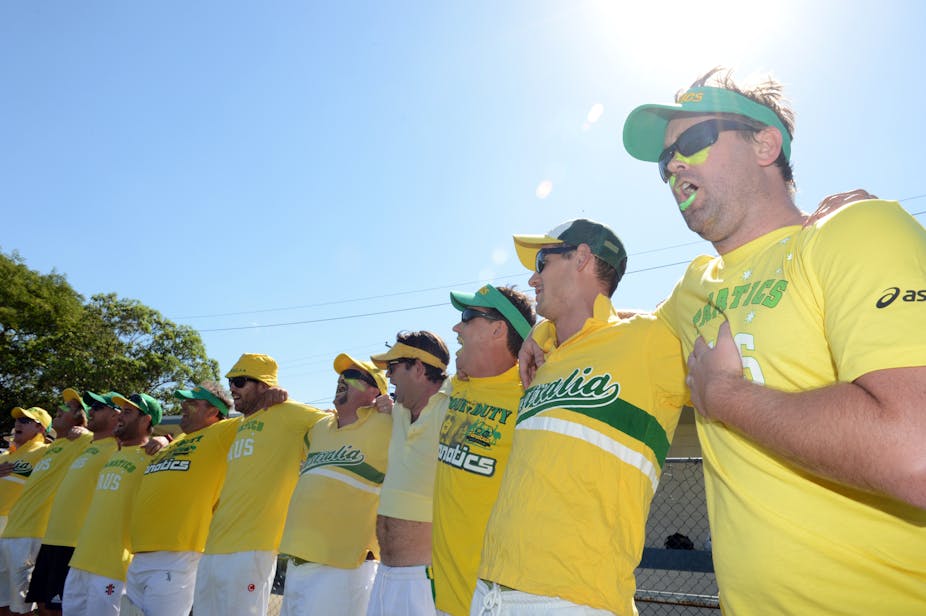Australia Day looms. Across the country, ceremonies large and small will stand for the national anthem. Lots of golden soil, nature’s gifts and girting by sea. The national anthem is ubiquitous now at major ceremonies and top sporting events.
It seems we’ve been Advancing Australia Fair forever. But things that now seem a natural part of the landscape are sometimes remarkably recent. And we only initially got there with a bit of luck.
Writing recently for The Conversation, Susan Broomhall speculated that we could well have been speaking Dutch if things had turned out slightly differently.
In a similar way, we would be singing a different anthem now, if only a couple of things had changed in the past.
There was certainly confusion at the Helsinki Olympics in 1952. When Shirley Strickland won gold in the 80 metres hurdles, the ceremony played two national anthems: Advance Australia Fair and God Save the Queen. Strickland remembered:
It took forever, but I loved every minute of it.
Before 1950, while God Save the Queen was the formal anthem, several other songs jostled as potential “national songs”. Foremost were Advance Australia Fair and Waltzing Matilda.
Advance Australia Fair was written in the mid 1870s by the Scots-born schoolteacher Peter Dodds McCormack. The four verses had a strong imperial connection, with several mentions of England and Britannia.
Waltzing Matilda had different origins. Its lyrics were written in 1895 by the poet, solicitor and soldier Banjo Paterson in the aftermath of the bitter shearers’ strike in Queensland.

Those origins resonated in the later popularity of the songs among different groups. In the 1950s the ABC started the day with different tunes on its main radio networks. The higher brow National network, with a more Anglophile audience, started in most states with Advance Australia Fair. The Light network began each day with the strains of Waltzing Matilda.
For the Melbourne Olympics in 1956, God Save the Queen was undisputed as the Australian national anthem. But there was also a Games song – to the tune of Waltzing Matilda:
Polling
Almost 30 years later, and only 30 years ago, Australia’s official anthem was still God Save the Queen. And in the contest to replace it, Advance Australia Fair only just saluted. With a few different events a generation back, we could well now all be waiting til the billy boils and stuffing jumbucks into tuckerbags.
Advance Australia Fair became Australia’s anthem in April 1984. The change followed two decades of controversy.
Up until the mid 1960s, there was strong support for God Save the Queen. Even in 1965 an opinion poll had almost 60% in favour. That support crumbled in the next decade.
A national song poll in 1974 found less than one in five now supported the imperial anthem. Most popular in its stead was Advance Australia Fair, followed by Waltzing Matilda.

The Whitlam government adopted Advance Australia Fair as the national anthem. That decision was reversed by the subsequent Fraser government in 1976, which returned to God Save the Queen. But, and importantly for this story, the government also chose Waltzing Matilda as the song to be played at any medal ceremony at the forthcoming Montreal Olympics.
The next year, in May 1977, a plebiscite asked for voters’ opinions on the matter. Some 6.5 million voted, with Advance Australia Fair (43%) ahead of Waltzing Matilda (28%), and God Save the Queen third (19%). Despite those results, the government kept God Save the Queen as the national anthem, with Advance Australia Fair as the “national song”.
Advance
Opinions had ebbed and flowed before. In the late 1940s, even though most Australians considered themselves “British”, there was reasonable support for an Australian national anthem. God Save the Queen then regained support in the 1950s, with the conservative Menzies Government and the popularity of the new Queen, Elizabeth II.
The choice of an Australian song in 1977 could similarly have been altered by different recent events. In particular, if Australia had won a swag of gold medals at Montreal in 1976.
In a sporting low point, Australia didn’t win any gold in Montreal, so Waltzing Matilda was never played at the medals ceremony. But if Australia had won, say, ten golds: think of the impact of that soundtrack fuelling two weeks of national pride. The song’s popularity would have boosted considerably – and would doubtless have gained a much stronger vote in the plebiscite nine months later.
In 1984, seven years after the plebiscite, the incoming Hawke government formally made the move to Advance Australia Fair. The song was modified – the official version has two verses, and no mention of Britannia. And even now we don’t hear much of the second verse, which includes:
For those who’ve come across the seas
We’ve boundless plains to share.
Even with the new anthem in 1984, it was not played anywhere near as much as it is now. Back then, many people shared the laid-back attitude of South Melbourne resident, Peter Brown. When the Herald Sun asked for his opinion on the new anthem, the 21-year-old said:
I don’t like flag-waving songs. “Click go the Shears” would be just as good – at least sheep can identify with it.
After 30 years, we all get used to things. Many might now criticise Brown’s laconic attitude as “un-Australian”. And most people now think it strange that a song about a sheep rustler was a serious contender for the national anthem.
But things could have been different. We might well be now celebrating an anthem with words most other English speakers don’t understand.
And decrying any alternative with a strange word like “girt”.

